How to Choose the Best Node.js Framework: Express.js, Koa.js or Sails.js
Updated 07 Aug 2023
8 Min
20257 Views
Holding it's firm position as the first choice for front-end development, JavaScript is no longer limited to it. The introduction and rapid growth of Node.js everything has changed. What is Node js used for? First of all, it lets developers build the server-side of the apps in JavaScript.
We are going to explore three Node.js backend frameworks: Express.js, Koa.js, and Sails.js. These are MVC server frameworks and written in JavaScript. Therefore, they share the same advantage - they are compatible across various browsers, devices, and OSs. To learn about their differences, lets delve into definitions a bit.
What Is the Best Node.js Framework and How to Choose It?
What are MVC frameworks for Node.js?
The frameworks that emulate MVC pattern for Node.js framework are also known as Node MVC frameworks. As the name implies Model View Controller approach is based on three components: model (which is business logic and data of the app), view (format and layout of data - app UI) and controller (which sends requests and updates between the two).
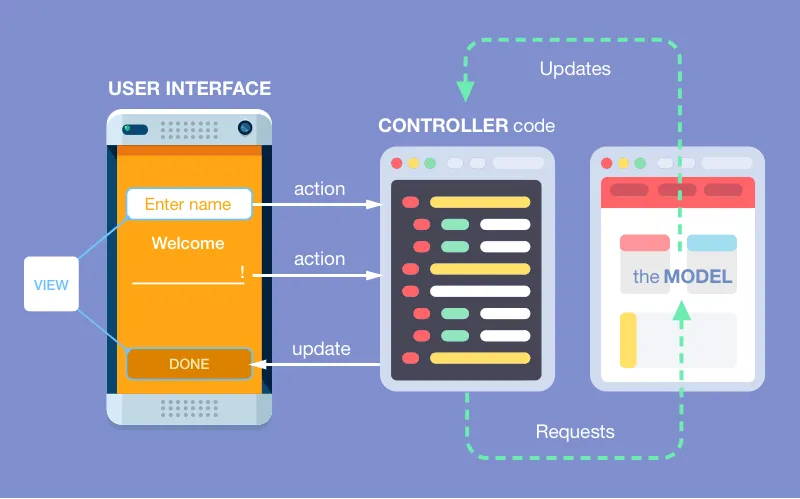
How MVC approach works
Frameworks that are based on MVC approach are generally good for enterprise-grade solutions and provide upfront support while being not so much flexible. For more simple solutions, a more lightweight Node.js server framework is a better option as they let apps be maintainable with less code while building and in many cases are based on middleware.
How middleware affects Node.js web development?
Middleware is a piece of software that glues and controls the flow of information between an application and the server, database, and operating system.
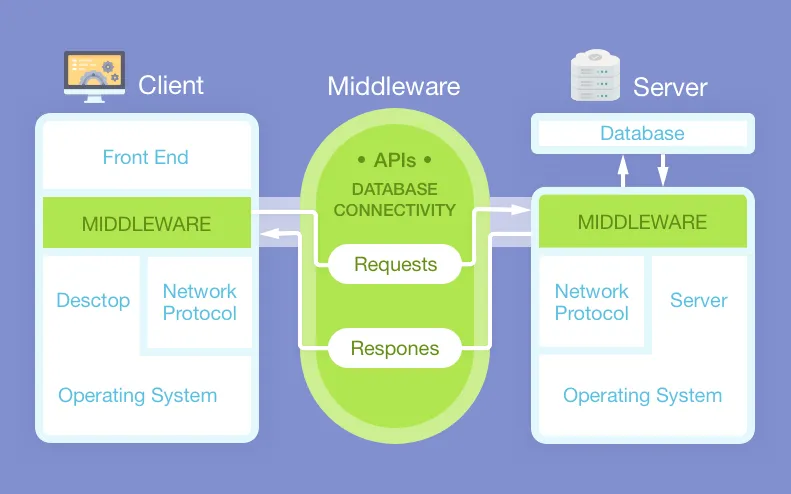
What is Middleware?
When you build Node.js apps, you can create a middleware of two types:
- Intermediaries: the elements that process the requests and responses, but they are not fully responsible for the request itself, so they delegate the request to the next layer.
- End elements: elements that are fully responsible for the final response. They process and modify the request and response, but do not delegate them to the next layers. In practice, the ability to delegate to the next layer is still preferable for architectural flexibility (for example, to add another layer), even though this layer does not exist (in this case the response is sent directly to the client).
Have you missed our story about the best frameworks for front-end development? Get to know which one is better: React or Angular.
Lets take a server-based component for managing users as an example. In terms of middleware, we have both end elements and intermediaries. The end elements should be able to create a user and display a list of users. But first we need intermediaries for authentication (since we do not want unauthenticated requests to create users). After we created the intermediary for authentication, we can simply integrate it into any place where we want to turn a previously opened opportunity into an authenticated one.
Apps that have a solid and well-build middleware are able to scale faster and, due to middleware chaining, have less bugs.
Now it's time to look at each of the three frameworks separately to choose the best framework for Node.js.
Why choose Express.js framework?
Express.js framework is a lightweight and flexible Node.js application framework, that provides a wide range of functions for building single-page, multi-page and hybrid web applications. This framework makes the creation of websites and apps using Node.js very simple.
Numerous members of Express.js community claim it is a good, thoughtful and powerful tool, despite it's self-positioning as a micro-framework. The other advantages of Express.js, middleware and routing, simplify the testing process and improve app performance.
With a powerful routed API, developers can perform tasks ranging from building an Express.js REST API server to building routes for a simple web application, and then taking it to the next level using the route parameters and query strings.
Express.js API also took advantage of the Node.js manager package node to distribute and install countless third-party plug-ins. You can easily add OAuth integration / social logins to the web application without much hassle, using this authentication middleware to connect.
However, there is no recommended method of organization, which can be a problem for beginners and experienced developers, since in the absence of an organization this can lead to non-repairability of projects. Moreover, there are many manual labor-intensive tasks involved which can affect the memory usage if are not handled professionally.
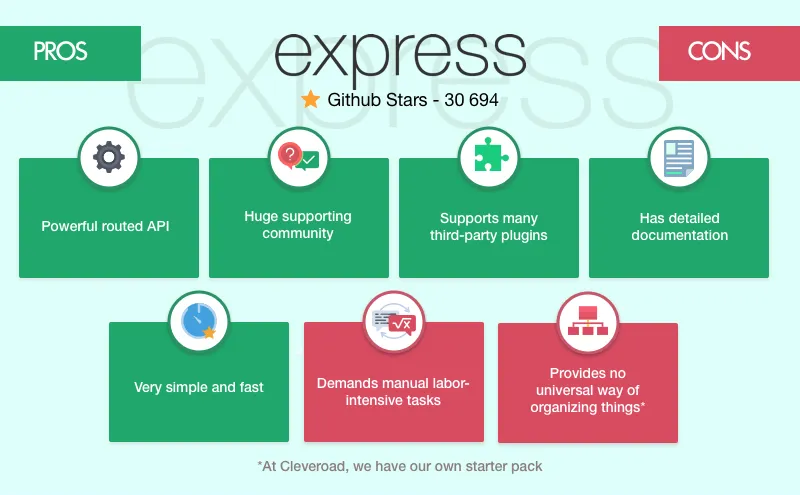
Pros and cons of Express.js framework
What kinds of projects is Express.js framework suitable for?
Middleware frameworks, like Express.js, are suitable for small and medium projects. If you are going to develop a large project that will be supported by a large team of developers, Express.js is not the best choice.
As for the usage examples, Express web framework was used as a middleware framework for MySpace, PayPal, and Klout sites.
Why choose Koa framework?
The development team behind the Express.js framework has created another middleware framework called Koa.js, the next generation futuristic framework for Node.js, which is referred to as one of Express.js alternatives and promises to be more concise and vivid in comparison with Express.js. Lets see whether this bald statement is justified.
Koa.js is focused on creating web applications and APIs with improved performance. Comparing to Express, which is based entirely on callback technology, separating out request and response objects, Koas main advantage is the usage of ES6 Generator feature. Koa generator is an excellent way to avoid callbacks, help developers to manage the code easier with the component-based building blocks and handle errors efficiently.
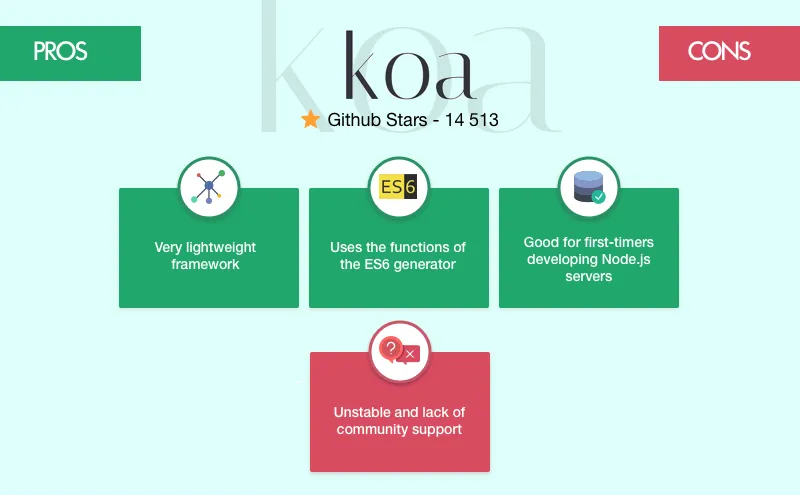
Pros and cons of Koa.js framework
What kinds of projects is Koa.js framework suitable for?
Koa.js is more lightweight and more modular than Express.js. This means that when you create an application there is not a ton of material, it's completely empty application, and you can only use the stuff you want.
Why choose Sails framework?
Sails.js is an MVC framework that allows you to create Node.js applications. It is based on the MVC (Model-View-Controller) pattern, like Ruby on Rails, but also supports the requirements of modern applications: software interfaces with a scalable, service-oriented architecture.
Special features of Sails.js:
- Due to a number of automated generators, it runs at a higher level in the development stack like Express.js.
- It exposes lots of Sails.js database adapters. Adapters are available in the Sails.js community for MySQL, MongoDB, PostgreSQL, Redis, and Microsoft SQL Server. Being able to use a single structure regardless of the data store background makes developers life much easier.
Do you know how much you need to implement your idea? Check out Cleveroad approach to the software project estimation.
- A middle ORM layer called Waterline provides the consistent syntax to access different databases, which allows developers forget about varied database query languages. ORM can be connected to any database, or even to user web services.
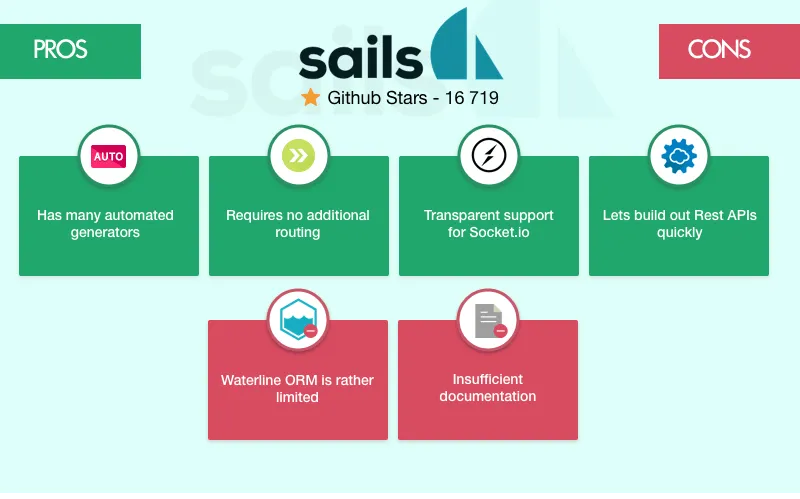
Pros and cons of Sails.js framework
What kinds of projects is Sails.js suitable for?
Node.js Sails framework is best suited for creating data-heavy enterprise-grade apps. This framework is especially suitable for the development of chat rooms, real-time toolbars and multiplayer games. However, the Sails development team may not be so great, especially if your developers have experience with Rails or Express, then there should not be any build-up problems.
How to choose best Node framework for your project?
The choice of the suitable Node.js framework highly depends on your project and the goals you pursue. Nevertheless, wed love to share our experience to help you make your choice.
Deciding on the Node.js web application framework for your project, you should pay attention to the following criteria:
- Community
- Documentation
- Versions upgrading
- Scalability
- System resources loading
- Performance
- Simplicity of development and testing
- Availability and variety of modules
- Customization
Being a web development company, we have a department of web engineers working at Cleveroad. We typically choose Express.js for web development services and have built a lot of apps with it.
First of all, the vast and active community of developers is important for both newcomers and experienced developers when building web apps with Node.js. Being able to get the professional advice is a great benefit. Of those three Node.js frameworks we are considering, Express.js has the biggest community. Just to compare, the framework has 7.9k followers on the Stack Overflow, while Sails.js has only 1k. Koa, unfortunately, trails behind.
Secondly, as for official documentation, Express.js docs are complete enough to help developers start off and provide support in tough cases.
The Node.js rest frameworks that utilize middleware approach do a better job in managing system resources. Express.js is one of them, which makes development and testing process more transparent. Moreover, as Express does not limit the choice of additional tools, we can freely handle with the integration of push notifications, payment gateways, in-app purchases, social media, analytics and everything our clients may require.
Hope this information shed some light over the reasons we choose Express and helped you get the difference. Just in case you want to create a Node.js app, feel free to get in touch with us anytime to your convenience.

Evgeniy Altynpara is a CTO and member of the Forbes Councils’ community of tech professionals. He is an expert in software development and technological entrepreneurship and has 10+years of experience in digital transformation consulting in Healthcare, FinTech, Supply Chain and Logistics
Give us your impressions about this article
Give us your impressions about this article